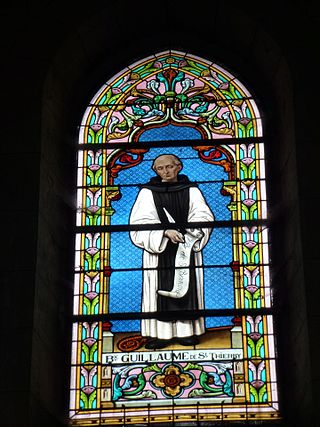Related Research Articles

Bernard of Clairvaux, O. Cist., venerated as Saint Bernard, was an abbot, mystic, co-founder of the Knights Templar, and a major leader in the reformation of the Benedictine Order through the nascent Cistercian Order.

Joseph Hall was an English bishop, satirist and moralist. His contemporaries knew him as a devotional writer, and a high-profile controversialist of the early 1640s. In church politics, he tended in fact to a middle way.

The Douay–Rheims Bible, also known as the Douay–Rheims Version, Rheims–Douai Bible or Douai Bible, and abbreviated as D–R, DRB, and DRV, is a translation of the Bible from the Latin Vulgate into English made by members of the English College, Douai, in the service of the Catholic Church. The New Testament portion was published in Reims, France, in 1582, in one volume with extensive commentary and notes. The Old Testament portion was published in two volumes twenty-seven years later in 1609 and 1610 by the University of Douai. The first volume, covering Genesis to Job, was published in 1609; the second, covering the Book of Psalms to 2 Maccabees plus the three apocryphal books of the Vulgate appendix following the Old Testament, was published in 1610. Marginal notes took up the bulk of the volumes and offered insights on issues of translation, and on the Hebrew and Greek source texts of the Vulgate.

Richard Challoner was a leading figure of English Catholicism during the greater part of the 18th century, and the titular Bishop of Doberus. In 1738, he published a revision of the Douay–Rheims translation of the Bible.

William of Saint-Thierry, O. Cist was a twelfth-century Benedictine, theologian and mystic from Liège who became abbot of Saint-Thierry in France, and later joined the Cistercian Order.
John of Fécamp, was an Italian-Norman Benedictine who was the most widely read of early medieval spiritual writers before the Imitation of Christ became popular, during a period called the Golden Age of Monasticism and of Scholasticism, and the height of the Papacy. Writing under the name of famous writers, he wrote the very popular book Meditations of St. Augustine and the book Meditations. He was born near Ravenna and died at Fécamp Normandy, as the Abbot of the Abbey of Fécamp. He was nicknamed 'Jeannelin' or 'Little John' on account of his diminutive stature.
Nicholas Love, also known as Nicholas Luff, was first a Benedictine and then a Carthusian monk in medieval England, and became the first prior of Mount Grace charterhouse in Yorkshire. He was the translator and reviser of a popular devotional treatise which was used by the Church authorities to counter the teaching of John Wycliffe. In his later years he convinced Henry V of England to attempt to reform Benedictine monasticism in England, but died before measures could be taken.
Francis Davenport, O.M.R., also known as Father Francis of Saint Clare, was an English Catholic theologian, a Recollect friar and royal chaplain.
Joseph Creswell was an English Jesuit controversialist.
Gabriel Gifford OSB was an English Roman Catholic Benedictine monk who became Archbishop of Reims.
William Reynolds was an English Roman Catholic theologian and Biblical scholar.
John Heigham was an English Roman Catholic printer, writer, and translator. He went into exile in Douai and Saint-Omer, where he married and brought up a family. A son John, who took holy orders, left Rome for the English mission in 1649.
Sir Robert Stapylton or Stapleton was an English courtier, dramatic poet and translator.
Guigo II, sometimes referred to as Guy, or by the moniker "the Angelic", was a Carthusian monk and the 9th prior of Grande Chartreuse monastery, from 1174 to 1180.

John Quarles was an English poet.
William Hyde (1597–1651) was an English Roman Catholic convert and priest, presumed to be of Dutch or Flemish background, who became President of the English College, Douai.
John Fursdon, in religion Cuthbert, was an English Benedictine monk.
Bernard Eyston, D.D. (1628–1709), was an English Franciscan friar, called in religion Bernard à Sancto Francisco.
Clement Reyner D.D. (1589–1651) was an English Benedictine monk, who became abbot of Lamspringe in Germany.
Anthony Stafford (1587–1645?) was an English Anglican devotional writer. He was in particular concerned for, and attacked over, the use of Marian devotions within the Church of England.
References
![]() This article incorporates text from a publication now in the public domain : "Batt, Anthony". Dictionary of National Biography . London: Smith, Elder & Co. 1885–1900.
This article incorporates text from a publication now in the public domain : "Batt, Anthony". Dictionary of National Biography . London: Smith, Elder & Co. 1885–1900.